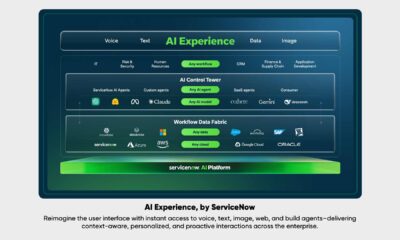Financial News
The Balancing Act of Financial Organizations to Compete in a Technology-Driven World
Written by: Ricardo Ferreira, EMEA Field CISO, Fortinet
Digital acceleration is impacting how we work, live, and consume services. In addition, the digital evolution of Financial Services Organizations (FSOs) raises essential questions about the future of banking. One looming concern is how FSOs will compete against fintechs, including addressing the need for innovation to improve customer experience.
Adapt to changing times
The top three strategic areas outlined in the IDC Infobrief, sponsored by Fortinet, “Accelerating Transformation Through Cybersecurity in Financial Services,” highlight the core priorities for financial institutions: Trust, Security, and Resilience. So, the question is, how can FSOs lead and win through innovation while ensuring that risks do not overwhelm a traditionally risk-averse industry?
Many FSOs have begun adopting new digital business models to help them thrive in a digital-first economy. These include prioritizing investments in key areas such as data-driven security, legacy modernization, and personalized and contextual customer experiences. But for these business models to work, they will need to rely on data, analytics, and cloud platforms.
So, when we ask, “what does success look like for the future-ready bank?” we see three major themes:
- Automation and cost reduction: Automation, managed services, and cloud platforms will enable FSOs to innovate faster. Automation allows business units to integrate with the rest of the organization, build self-service, and reduce manual labor costs, such as adopting Robotic Process Automation and artificial intelligence-powered chatbots to deal with insurance claims. In investment banking, robot advisors use machine learning-powered algorithms to help retail investors make better decisions. Thanks to cloud platforms and managed services, these new products and services are economically feasible because they shift traditional CapEx to activities that create more value.
- Customer intelligence and centricity: New platforms provide data and analytics for anticipating customer needs and hyper-personalizing the customer journey. Customer data, such as investment patterns, can guide a robot advisor to recommend portfolio choices aligned to customer preference. Similarly, natural language processing can help an AI system quickly assess a customer’s issue to redirect them to the nearest branch or get the appropriate representative involved.
- New value propositions: Open banking was a massive change for banks, helping them realize the power of APIs. Building Banking as a Service (BaaS) has allowed them to develop new services and create stronger partnerships.
But what about the customer experience?
Who is not irked when reminded of their first troubled mobile banking experience, with terrible UX and lack of integration? It’s why, when some fintechs launched their online mobile banking, it was a beacon of light in a dark room. A real-world security example that everyone might remember was the usage of biometrics for accessing online mobile banking. Big brands took a long time to adopt it, and while it might seem trivial from a UX perspective, it’s leaps and bounds towards progress.
Today, traditional brands regularly launch products that emulate offerings from nimbler fintech organizations. The lesson is clear: to gain a competitive advantage, banks must focus on creating a fast, intuitive, and seamless customer experience.
Are clouds grey in banking?
These business models require the accelerated consumption of new platforms, such as cloud computing. Financial organizations must understand they can create differentiated value and increase competitiveness by using the cloud to increase their speed of innovation and accelerate the go-to-market of new services and products.
Cloud platforms also serve as a bridge to modernize financial organization workloads. CIOs want to migrate workloads cohesively while ensuring the capabilities from their on-prem solutions are still available. Major Cloud Service Providers (CSPs) have jumped at the opportunity to integrate their environments into the same control plane.
Yes, but isn’t that risky?
Regulators have flagged the concentration risk. For example, the Bank of England has highlighted it in their stability reports. The latest Financial Conduct Authority (FCA) PS21/3 rules address third-party risk and operational resilience. And the European Union has gone a big step beyond with its Digital Operational Resilience Act (DORA).
All these activities and proposals are designed to address these concerns. The European Systemic Risk Board has flagged cyber as a systemic risk to the European financial system due to the increase in cyberattacks—especially in the financial industry, which is 300 times more likely to be the target of cyberattacks. The International Monetary Fund (IMF) emphasizes that cyber events propagate risk through the entire financial system via three broad transmission channels: risk concentration, risk contagion, and erosion of confidence.
That is why cybersecurity is a priority as part of the EU’s “Europe fit for the digital decade” policy program. Programs such as EU-HYBNET, ACCORDION, and DORA for financial services ensure Europe works as a single entity by harmonizing requirements to increase resilience and protect citizens.
What can financial organizations do about it?
To start, security needs to be woven into transformation efforts to ensure that innovation and transformation are conducted securely. For this to work, security must be included from a project’s inception, not as a bolt-on after a project and its services are launched.
What about protecting financial assets?
55% of European financial organizations already use some form of zero-trust strategy for their authorization and authentication. Zero-trust shifts the traditional paradigm from the implicit trust for users and resources inside a static, network-based perimeter to an authentication model that focuses on users, assets, and resources. Zero-trust requires authentication and authorization to be performed every time access is granted to a specific resource.
How do we address the ‘weakest link’ problem?
While people are an organization’s most critical asset, they are also the primary source of data breaches and network compromise. Organizations must be prepared for a loss of control if their workforce is not educated on cyber awareness. Some large financial organizations have created partnerships with e-learning portals and vendors to provide tailored courses using nudges and financial instruments to reskill the workforce with new technologies. Similarly, financial organizations must plan to mitigate the rampant cybersecurity skills shortage, which will impact 90% of organizations by 2025, resulting in delays in the transformational journey.
What can we do?
Digital acceleration is essential for competing in today’s financial marketplace. However, it doesn’t come without risk. First, ensure employees are trained and reskilled in the organization’s technologies. Second, share data with industry peers to learn best practices and identify potential issues. Transaction Monitoring Netherlands (TMNL) is an excellent example of transaction data sharing to mitigate Anti-Money Laundering (AML).
Finally, work with vendors and partners committed to cross-vendor openness and integration. When vendors work together across the threat landscape, the sum of their products is greater than the individual parts, deepening your level of cyber protection.
Financial
RISK, RESILIENCE AND A 96 PERCENT: WHAT ACCA’S TOUGHEST PAPER TAUGHT ME ABOUT STRATEGY

Preeti Peter, student – BCom ACCA – MAHE Dubai
Advanced Financial Management is a paper that separates theoretical knowledge from applied thinking. It tests your ability to make strategic decisions under uncertainty, weighs competing risks in real time, and defends your reasoning when there is not one right answer. The pass rates reflect that difficulty. When I sat for the exam, World Rank 1 was never the target, surviving the paper with credibility was. I scored 96 out of 100. But the number, on its own, tells you very little. What matters is what the journey demanded: a complete rewiring of how I approached preparation, pressure, and failure.
Treating preparation like a financial model
Early on, I made a decision that changed everything: I would stop following a generic study plan. Instead, I approached my preparation the way an analyst might approach a sensitivity analysis. I tested variables by studying at different times of the day, experimenting with visual mapping versus deep reading. Each iteration helped me identify what produced the best results for my learning style.
This was about precision, not volume. In finance, we talk about capital allocation, where you deploy resources matters more than the sheer amount available. I applied the same logic to my time. High-yield areas got the most attention. Weak spots got targeted effort. Comfortable topics got less.
Strategy is not a luxury reserved for boardrooms. It belongs in every decision you make.
The negative cash flow phase
There is a phase in every long-term project, financial or otherwise, where the output does not match the input. In corporate finance, we call this negative cash flow. You are investing, and the returns have not materialised yet.
My first few weeks of AFM preparation felt exactly like that. I was putting in the hours, but comprehension was patchy. It would have been easy to panic or abandon ship for a different approach.
Instead, I recognised the phase for what it was: temporary. Every business that reaches breakeven has survived this stage first. I leaned into discomfort, trusted the process, and kept showing up. Slowly, the fog lifted.
That early patience was critical. If I had changed course every time results lagged behind effort, I would never have built the understanding that carried me through the exam.
Discipline over motivation
There is a popular idea that success comes from being motivated. I found the opposite to be true. Motivation is unreliable, it fluctuates with your mood, your energy, a difficult question that throws you off balance.
What carried me was routine. I built a daily structure that operated regardless of how I felt on any given morning. Good days and bad days received the same treatment: sit down, open the material, work through the plan.
During my time at Manipal Academy of Higher Education Dubai, I learned to value consistency over intensity. Resilience, I realised, is not about gritting your teeth and pushing through pain. It is about designing a process robust enough to function even when you are running on empty.
Confronting discomfort deliberately
One of the more counterintuitive lessons AFM taught me was about comfort zones. When preparing for a high-stakes exam, there is a strong temptation to practise what you already understand. You move through questions quickly, confidence builds, and the work feels rewarding.
But that feeling is misleading. The topics I avoided, the ones that made me uneasy, the questions I got wrong repeatedly were precisely where the growth was. I started restructuring my study sessions to front-load the most difficult material. If a topic made me uncomfortable, it went to the top of the list.
Over time, those uncomfortable sessions became the foundation of my exam performance. The questions that would have caught me off guard were the ones I was most prepared for.
Managing pressure, not just content
I remember finishing a mock exam and feeling genuinely defeated. The time pressure had overwhelmed me. I knew the material but knowing the material and performing under timed conditions are two very different skills.
That experience changed my approach. I began treating exam technique as its own discipline, separate from subject knowledge. I practised under strict time limits and developed a method for approaching unfamiliar questions: pause, outline, then write.
On exam day, there were moments where questions looked unfamiliar at first glance. Instead of panicking, I paused, outlined a structure, and worked through each part methodically. I finished on time, with every question addressed.
The real lesson: stress does not disappear because you have prepared well. You simply get better at functioning within it.
Feedback as fuel
A score of 96 percent might suggest a clean, linear path to the top. The reality was messier. Mock results were humbling. Feedback on practice answers was sometimes blunt.
But I made a conscious decision early on, I would treat every piece of critical feedback as information, not as judgement. If a mock answer missed the mark, I wanted to understand why so, to close the gap between where I was and where I needed to be.
That openness to correction was, I believe, one of the most important factors in my result. The students who improve fastest are rarely the most talented. They are the ones willing to be told they are wrong and to adjust accordingly.
Beyond the exam
World Rank 1 was a rewarding outcome. But the rank is a snapshot, a single data point from a single day.
Structured thinking. Disciplined preparation. The ability to remain calm when the stakes are high. A willingness to sit with discomfort rather than avoid it. These are not exam skills. They are life skills.
AFM taught me that risk is not something to fear. It is something to understand, to price, and to manage. That principle holds whether you are valuing a derivative or deciding how to spend your next hour. The same applies to every challenge worth pursuing.
Financial
Abu Dhabi-Based Asif Aziz Will Illuminate London’s West End with Ramadan Lights for Fourth Year, Expanding Global Cultural Impact


Abu Dhabi–based businessman and philanthropist Asif Aziz, Founder of Criterion Capital, continues to set the benchmark for large-scale public programming as his landmark Ramadan Lights London initiative returns for a spectacular fourth edition.
Having launched Western Europe’s first-ever aerial Ramadan lights in 2023, Aziz has permanently reshaped the cultural landscape of London. What began as a groundbreaking concept has since evolved into a globally-recognised, free, annual celebration delivered for civic good, placing the values of Ramadan at the heart of one of the world’s most influential cities.
Delivered through Aziz’s charity, The Aziz Foundation (Registered Charity: 1169558), Ramadan Lights London demonstrates values-led leadership at scale, showing how faith, culture and community can intersect to create lasting social impact.

At the heart of the programme is the flagship aerial lights display along Coventry Street: a pioneering installation of more than 30,000 sustainable LED lights arranged in intricate geometric patterns inspired by Islamic art, with motifs representing suhoor and iftar.
The 2026 programme will open with a high-profile switch-on ceremony, with the lights activated by Sir Sadiq Khan, Mayor of London, Rahima Aziz BEM, Trustee at The Aziz Foundation, and Adil Ray OBE, actor and broadcaster, in the presence of senior public leaders, distinguished cultural figures, ambassadors and international dignitaries. The display will remain illuminated until 18th March 2026, before transitioning to Eid Lights through to 24th March 2026.

A selection of artworks featured in Shared Light – central London’s first interfaith art exhibition. Left: Rooh-e-Bhag (Soul of the Garden) (2025) by Mohamad Aaqib Anvarmia. Centre: Hospitality of Abraham – After Rublev (2025) by Meg Wroe. Right: Mettavihari (2025) by Colin Panrucker
This year will also see the launch of Shared Light – central London’s first interfaith Ramadan art exhibition – bringing together artists of all faiths and backgrounds whose work is inspired by the values of Ramadan. The exhibition will be unveiled by the Deputy Lord Mayor of Westminster and hosted at Aziz’s Zedwell hotel at Piccadilly Circus, reinforcing culture’s role as a bridge between communities in one of the world’s most iconic city centres.

Ramadan Lights London will also welcome back Ramadan Delights, London’s first curated iftar food trail, introduced by Aziz in 2025 and now firmly established as a district-wide West End experience. The trail brings together leading international brands and heritage institutions – including Fortnum & Mason, 1 Leicester Square Rooftop, PizzaExpress and Shake Shack- offering special menus, exclusive offers and halal-friendly dining while supporting local businesses and the economic vitality of the area.
This year, the initiative is further strengthened through a partnership with Centrepoint, the UK’s leading youth homelessness charity, reflecting a shared commitment to social mobility, economic empowerment and supporting disadvantaged young people.
Commenting on the programme, Asif Aziz said: “Ramadan Lights London reflects how the values of Ramadan – generosity, reflection and empathy – can contribute meaningfully to civic life. It is about thoughtful engagement and creating shared experiences that strengthen communities and endure over time.”
Beyond Ramadan Lights London, Aziz’s wider philanthropic work continues to deliver impact. Since 2015, The Aziz Foundation has awarded over 750 scholarships, supported more than 100 media internships, and delivered extensive mentorship programmes across key industries. Aziz is also leading the regeneration of Criterion Capital’s Grade II-listed London Trocadero, transforming the landmark into a 1,000-capacity mosque and community centre – a long-term investment in cultural and faith infrastructure in a major global city.
Alongside his charitable endeavours, Aziz is establishing a scalable, world-class co-investment platform in Abu Dhabi, working with UAE institutions to deploy capital into transformative urban and living-sector opportunities across Europe and the Middle East, with a continued focus on sustainable social outcomes.
Financial
UAE ATTRACTS $40BN IN FDI AMID GLOBAL UNCERTAINTY, NEW REPORT SUPPORTED BY QASHIO REVEALS

As geopolitical tensions, de-globalisation, and economic uncertainty reshape global capital flows, the United Arab Emirates (UAE) is consolidating its position as one of the world’s most trusted and resilient financial gateways, according to a new report by Emerging Markets Intelligence & Research (EMIR), supported by Qashio.
The report, ‘Mapping the UAE’s Role as a Global Financial Gateway’, highlights how the UAE is attracting high levels of foreign direct investment and financial activity at a time when capital is retreating from many traditional markets.
Foreign direct investment into the UAE doubled to $40 billion (between 2019 and 2024), reaching record levels even as global FDI stagnated. In 2024, FDI accounted for 40% of the UAE’s gross capital formation, compared to just 4.3% across developed economies, underscoring the country’s growing role as a destination for long-term, trust-led capital.
The scale of activity is accelerating rapidly. The UAE recorded 1,362 FDI projects in 2024, representing a 350% increase since 2020, while assets under management in the Dubai International Financial Centre (DIFC) reached $700 billion, growing 58% year-on-year.
According to the report, the UAE’s ability to benefit from global realignment is closely linked to its neutrality, regulatory clarity, and institutional agility.
“The UAE is actually benefiting from the de-globalisation and the geopolitical reorientation of major power blocks. It doesn’t have adversaries, so is able to build economic ties with everyone. The speed with which the government has been able to adapt to and anticipate the new situation is remarkable,” the report notes.
Beyond capital inflows, the research also points to the UAE’s expanding role as a transaction and payments hub, supported by modern financial infrastructure, strong compliance frameworks, and growing confidence among global businesses managing cross-border activity from the region.
From Qashio’s perspective, the UAE’s rise as a financial gateway reinforces the importance of secure, transparent, and compliant financial operations for businesses operating in an increasingly complex global environment.
“As capital flows become more fragmented and regulated, trust and control are no longer optional — they are foundational,” said Armin Moradi, Founder and CEO of Qashio. “Businesses operating from the UAE need full visibility over spending, strong compliance with Central Bank guidance, and the ability to act on financial insights in real time. This report reflects why the UAE has earned global confidence — and how organisations can operate responsibly within that ecosystem.”
The findings position the UAE not only as a safe destination for capital, but as a jurisdiction capable of supporting long-term growth across finance, trade, technology, and digital assets — at a time when global businesses are reassessing where and how they deploy resources.
To learn more about how the UAE is consolidating its role as a trusted global financial gateway and what this means for businesses navigating today’s fragmented capital landscape download the full report here.
-

 Tech News2 years ago
Tech News2 years agoDenodo Bolsters Executive Team by Hiring Christophe Culine as its Chief Revenue Officer
-
News10 years ago
SENDQUICK (TALARIAX) INTRODUCES SQOOPE – THE BREAKTHROUGH IN MOBILE MESSAGING
-

 VAR11 months ago
VAR11 months agoMicrosoft Launches New Surface Copilot+ PCs for Business
-

 Tech Interviews2 years ago
Tech Interviews2 years agoNavigating the Cybersecurity Landscape in Hybrid Work Environments
-

 Tech News8 months ago
Tech News8 months agoNothing Launches flagship Nothing Phone (3) and Headphone (1) in theme with the Iconic Museum of the Future in Dubai
-

 Automotive1 year ago
Automotive1 year agoAGMC Launches the RIDDARA RD6 High Performance Fully Electric 4×4 Pickup
-

 VAR2 years ago
VAR2 years agoSamsung Galaxy Z Fold6 vs Google Pixel 9 Pro Fold: Clash Of The Folding Phenoms
-

 Tech News2 years ago
Tech News2 years agoBrighton College Abu Dhabi and Brighton College Al Ain Donate 954 IT Devices in Support of ‘Donate Your Own Device’ Campaign























